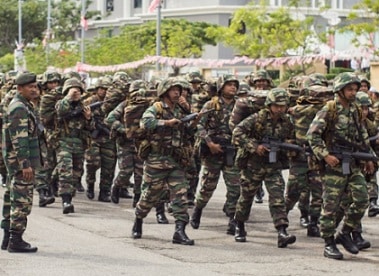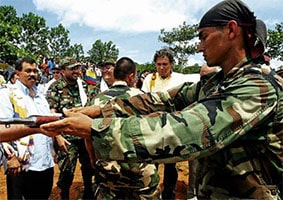 Demobilization is the process and consequence of demobilizing : giving leave to mobilized troops or individuals. The idea of mobilization, in this framework, refers to calling up or preparing military units for combat.
Demobilization is the process and consequence of demobilizing : giving leave to mobilized troops or individuals. The idea of mobilization, in this framework, refers to calling up or preparing military units for combat.
Demobilization implies the abandonment of military activity following a discharge . This action is massive and generalized at the end of a war, although it can be carried out in different ways and have different scope.
Suppose that a country gathers all its soldiers and calls up its reservists before the outbreak of a war with a neighboring nation. Months later, peace is signed between both States and the battles end. In this way, the demobilization of the troops occurs: the combatants obtain a license and are no longer enlisted for armed conflict.
The idea of demobilization is also used with respect to the reintegration into civilian life of the members of a guerrilla or insurgent faction . This type of demobilization is usually achieved when a peace agreement is signed and guerrilla or rebel leaders agree to abandon violence.
In Colombia , for example, demobilization has been carried out, in different stages, since the 1990s to end the internal conflict. Through demobilization, the aim is for guerrillas and paramilitaries to hand over their weapons and return to functioning as civilians, acting as established by law .
To promote demobilization and facilitate the reintegration of ex-combatants, Colombia has the Agency for Reincorporation and Normalization . This entity aims to help the social reintegration of demobilized people.
This agency is part of the Presidency of the Republic of Colombia , the highest authority of the Colombian State, which is in charge of the Armed Forces. Broadly speaking, we can say that its objectives and tasks include coordination, advice and execution of reintegration. This is carried out in conjunction with other entities, both in the private and public spheres, and focuses on those individuals who have been demobilized from armed groups that have been formed and administered illegally.
 One of the most significant examples of demobilization in Colombia in recent history took place in 2006, when the target was the terrorist organization known as the United Self-Defense Forces of Colombia , or under the acronym AUC . It was founded in 1997, and its activities included drug trafficking, as well as the use of weapons in different conflicts.
One of the most significant examples of demobilization in Colombia in recent history took place in 2006, when the target was the terrorist organization known as the United Self-Defense Forces of Colombia , or under the acronym AUC . It was founded in 1997, and its activities included drug trafficking, as well as the use of weapons in different conflicts.
Two other guerrilla organizations whose demobilization marked a before and after were the Revolutionary Armed Forces of Colombia – People's Army and the National Liberation Army , whose acronyms are FARC-EP and ELN , respectively. Between this massive phenomenon and the goal of making reintegration sustainable in the long term, in 2006 the Presidential High Council for Reintegration was founded, which five years later changed its name to the Colombian Agency for Reintegration .
One of the concepts related to demobilization is the General Amnesty Law , a bill that the Colombian government presented to grant amnesty to illegal combatants. The beneficiaries of this law are the participants of self-defense groups as well as guerrillas who have received a sentence for their involvement in an armed conflict.
The main objective was to reincorporate these people so that they could contribute effectively in the nation's search for peace . After the trial it is possible to establish a trial that lasts a maximum of five years before the accused regains his freedom.
